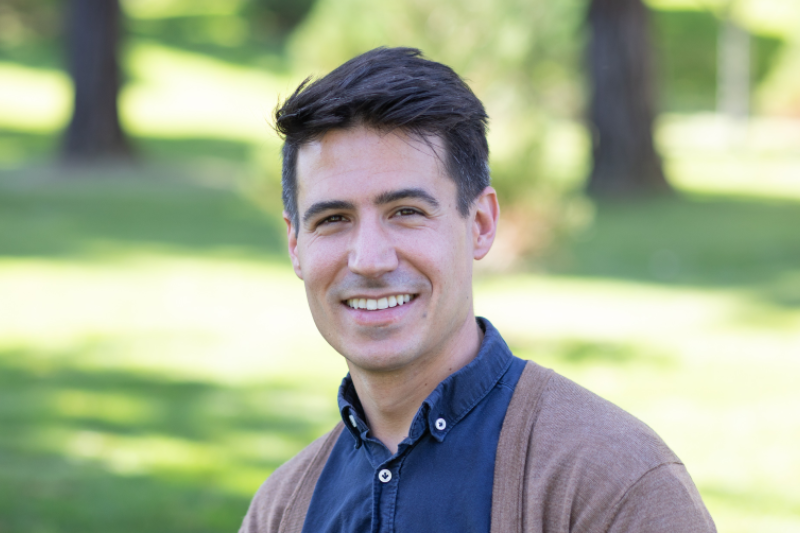Passing Forward the Passion: Meet ECE’s Newest Faculty Member

One conversation with Sergio Carbajo and it’s unmistakably evident where his passions are rooted. He excitedly talks about transforming the education system through mentorship, carefully explains his research in layman’s terms, and bleeds interest in informing future generations about the effects of their research. It’s appropriate, then, that this upcoming school year, he will be joining the Electrical and Computer Engineering Department as its newest faculty member. So it makes it surprising, then, that someone so invigorated about education formerly steered clear of pursuing any sort of career in this realm.
Carbajo grew up in a small community in Spain within the Basque Country, known for its rich culture, picturesque views, and title as the home of one of the oldest languages in Europe. While Carbajo recognizes that this was a pleasant and charming place to be raised and receive his Bachelor’s degree in Telecom Engineering, “I always knew on some deep level that I needed to leave my hometown…. Part of me needed to discover other realities,” he says.
For Carbajo, that meant moving to Colorado in order to receive his PhD, although he initially only saw it as an opportunity to obtain his VISA and “to try something new.” Colorado presented its challenges though, and although he was able to obtain his Master’s Degree in Electrical and Computer Engineering, he eventually dropped out of his PhD program, atypical of someone with a resumé as impressive as his. He remembers, “I really was convinced, ‘I want to have nothing to do with academia and just find a job and get out of here.’”
He attributes part of this discouragement to his own background. Carbajo is not only a proud first-generation college graduate, but also a first-generation high school graduate, and although many would consider this a personal success, it did not come without the doubts that many first-generation graduates face. “I believed for the most part of my youth and part of my early adulthood that I personally did not belong in this sphere because I didn’t have an example [to look up to].”
Then he was invited to visit a lab at MIT, which changed how he viewed the academic life which he had abandoned not long before. “I realized that a PhD program can look very different, not just simply in the discipline of the study, but in the very people you’re working with.” That realization prompted his return to academia, in a move that allowed him to receive his PhD in Physics at the University of Hamburg through a joint doctoral program with MIT.
Soon after, he joined the Stanford Linear Accelerator Center (SLAC), “a national laboratory run by Stanford and the Department of Energy,” performing research that will be brought to his experiences at UCLA. Carbajo’s area of expertise surrounds light matter interactions, or “creating light by design.” Using lasers, Carbajo examines molecular dynamics, what he describes as “movies of molecules or atoms responding to light excitation…. It’s almost like instant action movies of molecular dynamics.” Studying photons and its dynamics can have implications for technological developments in areas such as photosynthesis, so that “you can harvest energy from the sun that is not based on silicon panels—for example, solar panels—but can be made from artificially-made photosynthetic centers.”
Subjects such as these are included in the vast knowledge Carbajo plans on bringing to the classroom and the laboratory as he adds “professor” to his title, a feat that once seemed out of reach until a mentor suggested that Carbajo should apply for a faculty opening in Arizona. Such a proposition initially seemed ludicrous as a first-generation college student who felt he had already surpassed the expectations for someone of his stature; but in reflection, he says, “I’m really grateful for that [suggestion].” Though the teaching position didn’t end up manifesting, the encouragement to pursue it precipitated a greater desire to pursue these types of roles.
This type of mentorship naturally carried over into Carbajo’s role at SLAC, where he holds the role of researcher and mentor for students. Mentoring others was an individual pastime for him, separate from his job description, but an important one in guiding him into his realization that academic careers held a future for him. He explains, “I started recognizing that as I age and I grow and as my value system changes, I realize that I belong better in an academic environment because I truly enjoy spending time with students and mentoring them.” Examining academia and its inherent flaws further pushed Carbajo into pursuing the field as someone who serves the public rather than someone who takes from it.
Such a personal fulfillment, along with working alongside faculty and students, is what makes the newly-minted professor excited to work at UCLA during the upcoming school year. If you ask him about what he’s looking forward to, he’ll eagerly list the “great intellectual independence” of the faculty, recruiting students for labs, and classes he’s already drafting for future students, ones that may allow crossover between the humanities and the sciences.
Years ago, Carbajo wouldn’t have imagined himself uttering and sharing such ideas. But the same empowerment that being educated gave to the small-town visionary from Spain is what Carbajo hopes to pass forward. “I think the classroom is a great place… for education in the sense of transmitting some sort of knowledge, and a great place to train people to think critically and ask questions…. There’s a lot of power that can be used the right way in a classroom.”
